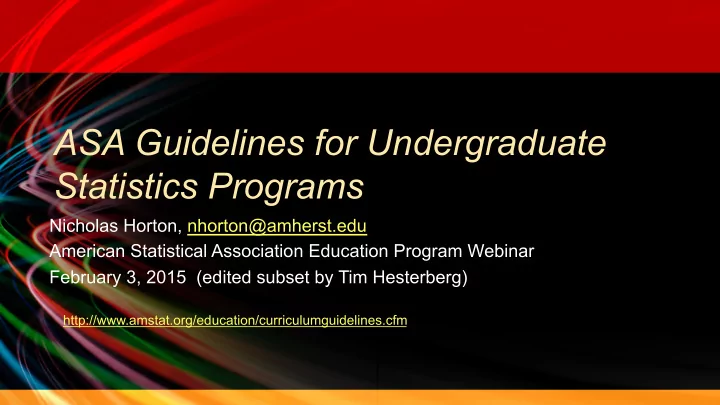

ASA Guidelines for Undergraduate Statistics Programs Nicholas Horton, nhorton@amherst.edu American Statistical Association Education Program Webinar February 3, 2015 (edited subset by Tim Hesterberg) http://www.amstat.org/education/curriculumguidelines.cfm
Executive summary: solve real-world problems • Increased importance of data-related skills in modern practice • More emphasis on teamwork, communications, and related experiences (e.g., internships, REUs, and capstones) • Motivation: other disciplines have staked their claim • As statisticians, we run the risk of becoming irrelevant if we don’t aggressively engage
Key changes: importance of data science • Working with data requires extensive computing skills far beyond those described in the previous guidelines • Students need facility with professional statistical analysis software, the ability to access and “wrangle” data in various ways, and the ability to utilize algorithmic problem- solving • Students need to be able to be fluent in higher-level languages and be facile with database systems
Data-related topics • Use of one or more professional statistical software environments • Data analysis skills undertaken in a well-documented and reproducible manner • Basic programming concepts (e.g., breaking a problem down into modular pieces, algorithmic thinking, structured programming, debugging, and efficiency) • Computationally intensive statistical methods (e.g., iterative methods, optimization, resampling, and simulation/Monte Carlo methods)
Statistical practice • Effective technical writing, presentation skills, and visualizations • Practice with teamwork and collaboration • Ability to interact with and communicate with a variety of clients and collaborators
Recommendations at the core of the guidelines • Students need to be able to “think with data” (Lambert) • Need multiple opportunities to analyze messy data using modern statistical practices • Key theoretical concepts (design and confounding!) need to be integrated with data preparation, analysis, and interpretation • Mathematical techniques play a lesser role (still important for people planning doctoral work in theoretical statistics)
Recommend
More recommend